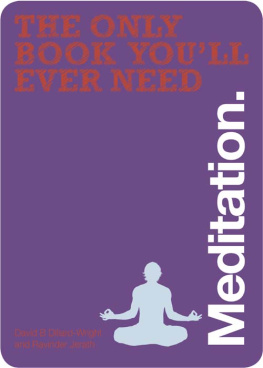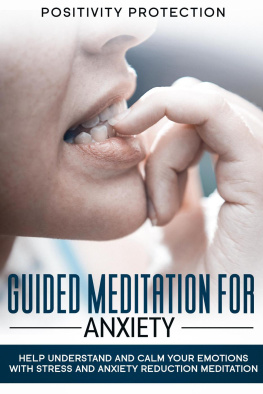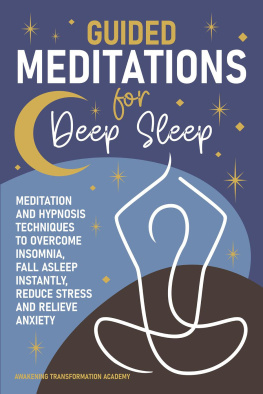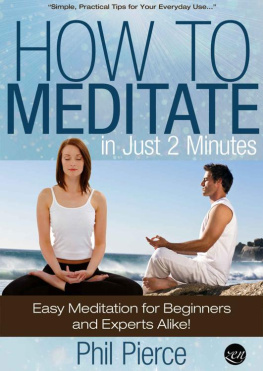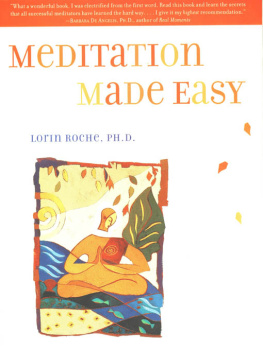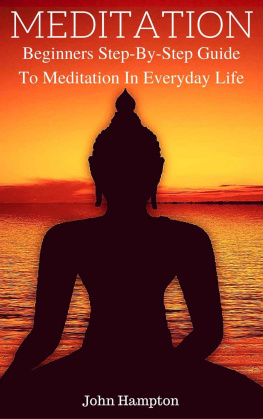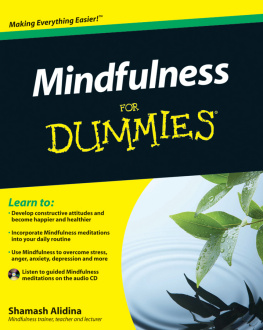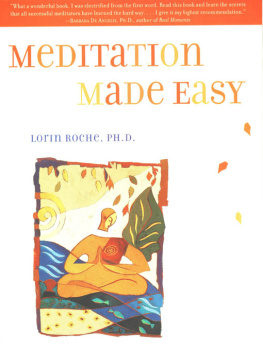1. Because you are envious of the happy expression on your dogs face.
2. Because life doesnt come with a reset button.
3. Because you want to want to get out of bed in the morning.
4. Because coffee isnt cutting it anymore.
5. Because they dont make industrial-strength vitamins.
6. Because you have always secretly wanted to buy a nature-sounds CD.
7. Because your boss will not, apparently, be hiring an assistant for you.
8. Because you owe it to yourself.
9. Because today is the first day of the rest of your life.
10.Because youre human.
Introduction
Meditation is recommended as one of the basic tools for just about every path to self-improvement or spiritual practice. Meditations in churches, temples and mosques unite people in mind and spirit. In secular life, meditations for group therapy, celebrations and memorials give us moments to reflect and remember important things. And when a vital message is passed on to us, we may be asked to meditate on it. Meditation is more a part of our lives than we realise.
Meditation is supposed to quiet you, to focus your mind on just one thing. While its possible for most of us to accomplish this focus, it usually doesnt last long. The business of living must be tended to, so we go on to other things. Work, home and social life are important, and meditation appears to have little to do with them. Who has the time to do nothing?
Actually, the practice of meditation should be at the core of our lives. Its the basic tool that allows every act to have meaning and richness. Meditation doesnt have to be a separate, special event that takes us away from our responsibilities or leisure. It can be an ongoing process that is part of everything we do.
If youve had experience with meditation, perhaps you took it for granted as time went by. You may have started with the basics and became discouraged when you didnt see the results you expected. So you went off to learn other things that seemed more interesting. Or, perhaps you never really got the chance to learn to meditate; you just imitated those around you by being quiet and respectful.
If meditation is an idea that you want to explore, what is the best way to go about it? And if you occasionally meditate, how can you develop and grow with it?
There are many approaches to meditation. Some may appear to be simple and practical; others may seem otherworldly and impractical. You may find books on styles or schools of meditation that present words and concepts that are way over your head. Or you may have looked into classes that turn out to be too religious, or not spiritual enough.
To find the meditation style that best suits you, its fair to look at what each style offers and decide what features are suitable for you. Youll have an opportunity to do that with this book. Youll learn that its not necessary to limit yourself to one meditation style. We live in an age when nearly all of the meditation traditions have come out of cultural isolation to offer a variety of paths for self-discovery.
By incorporating what reflects your unique nature, whether it is two or three styles, or a dozen, you will be able to design a meditation practice that reflects all that you are.
As you begin, you will discover the keys that open the door to your potential as a human being. Youll enter a vast and beautiful dimension that all who have lived before you discovered in some way through life. In this place youll find ways of meeting challenges and coping with problems. Youll also find new ways to engage your life with experience that teaches, heals and enhances everything around you. It will take some work, but it is a labour of love that you deserve to give yourself.
If discovering greater meaning and purpose in life isnt reason enough to begin a meditation practice, the physical benefits should be. Over the past few decades, evidence has been mounting that suggests meditation helps to reduce the harmful effects of stressful lifestyles. Do you want to have more energy? Reduce the risk of a heart attack? Control depression and anxiety? Often, our first response to such problems is to reach for a pill bottle, but perhaps more ancient ways of combating them should be employed alongside modern Western medicine. Perhaps people living thousands of years ago had some wisdom about life that we have lost with our fast-paced, technology-driven societies. And yet, at the same time, our technology and science help us to understand ancient practices better, to find empirical explanations for how and why they work. In this book, you will find a mixture of ancient practices and scientific explanation, and you will see how differing schools of thought agree that meditation really does promote healthy living.

